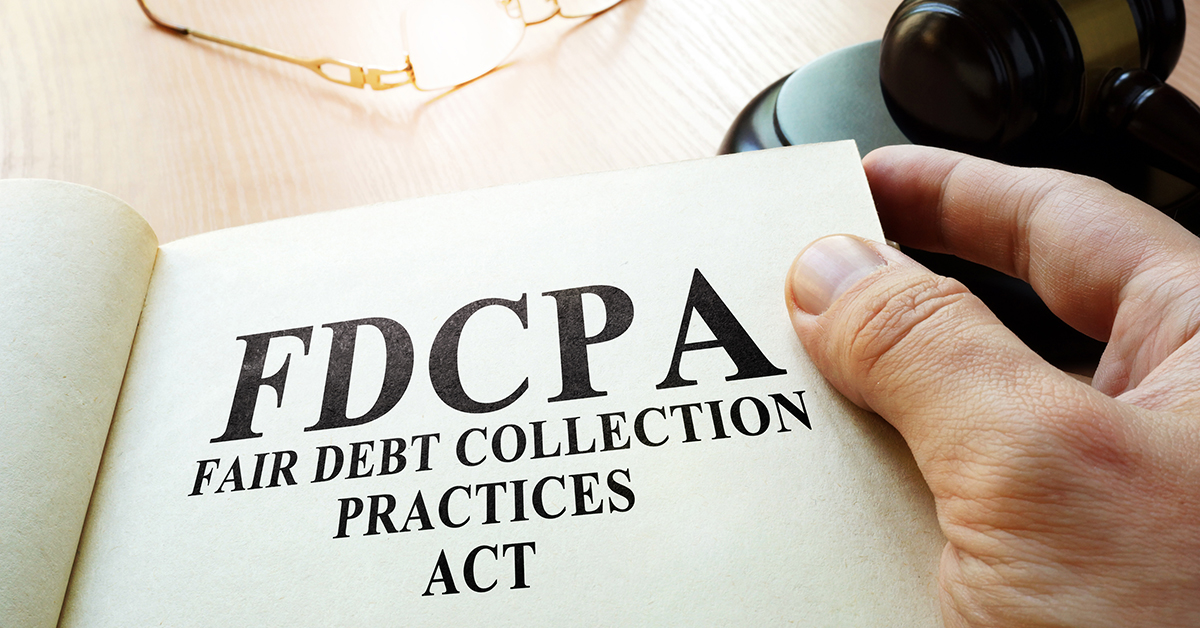Debt collection harassment affects millions of Americans. Did you know that debt collectors have to follow certain laws when they contact you, whether or not you owe the debt?
What is the FDCPA?
The Fair Debt Collection Practices Act (FDCPA) is the main federal law that governs debt collection practices. This law prohibits debt collection companies or law firms from using abusive, harassing, unfair, or deceptive practices to collect debt from consumers.
The law covers personal, family, and household debt, including money owed on a personal credit card account, a medical or utility bill, or a loan. Commercial debts, or debts incurred as a business or commercial transaction, are not covered under this law.
Whether a debt is owed or not, collectors are not allowed to intimidate, harass, threaten, or abuse you. You may be able to sue the collector for violations of the FDCPA at no cost.
When Can Collectors Contact Me?
Collectors can contact you by phone between 8 a.m. and 9 p.m., unless you inform the collector that they are permitted to contact you outside those hours. For example, some people work shifts that would make it inconvenient to receive calls during those hours. You can request that the collector contact you during certain hours which are convenient to you. It is important to document collection calls with date, time of day, name of collector, caller ID, and details of a phone conversation or message.
Collectors may call you at work if you give them permission. If your employer does not permit you to have personal calls at work, you can inform the collector to stop calling during work hours.
Can the Collector Contact Me if I’m Represented by an Attorney?
After engaging an attorney to assist with your debt, you should inform the collector by sending a letter stating your attorney’s name and contact information. At this point, the collector is no longer permitted to contact you directly. If you continue to receive collection calls or letters, your consumer rights under the Fair Debt Collection Practices Act may have been violated.
Can the Collector Contact Someone Else About My Debt?
Collectors are not allowed to contact anyone other than yourself about your debt, unless it is to get contact information. Many times we hear that relatives, neighbors, co-workers, or friends have received contact from debt collectors about someone else’s debt. Often the collector shares details about the debt, such as payment history and amounts owed. In these situations, it is very important to create a document stating the date, time of day, name of caller, name of collector, Caller ID and details of the conversation or phone message.
Seek Free Legal Help
Flitter Milz is a nationally recognized consumer protection law firm that represents victims of a debt collector’s abusive tactics. Contact Us for a free legal evaluation.

 Co-signers lend their names and good credit histories to the primary borrower, usually when the other borrower cannot obtain credit on his or her own. For example, a parent may co-sign for a child who does not yet have a credit history. Or, someone may be asked to co-sign by a friend or relative whose credit is tarnished, has negative marks in their credit history, or a low
Co-signers lend their names and good credit histories to the primary borrower, usually when the other borrower cannot obtain credit on his or her own. For example, a parent may co-sign for a child who does not yet have a credit history. Or, someone may be asked to co-sign by a friend or relative whose credit is tarnished, has negative marks in their credit history, or a low  Flitter Milz is a nationally recognized consumer protection law firm representing people in matters against lenders, debt collectors and the credit bureaus. Whether you or the co-borrower has fallen behind on payments or not,
Flitter Milz is a nationally recognized consumer protection law firm representing people in matters against lenders, debt collectors and the credit bureaus. Whether you or the co-borrower has fallen behind on payments or not, 







